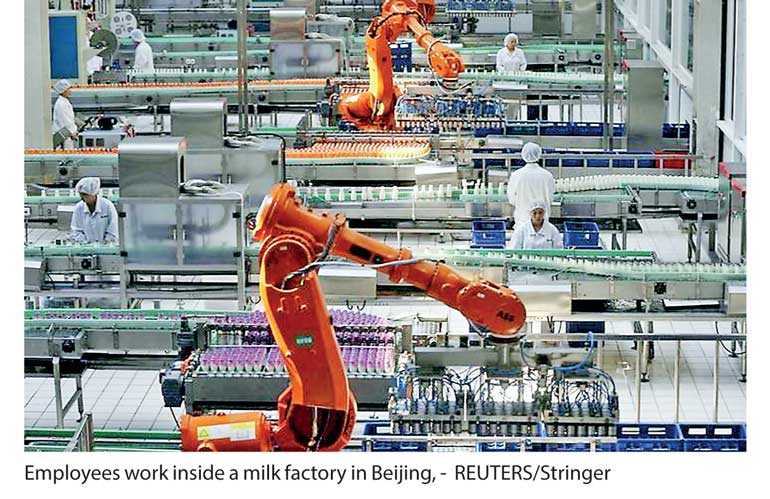Thursday Feb 26, 2026
Thursday Feb 26, 2026
Thursday, 12 April 2018 00:00 - - {{hitsCtrl.values.hits}}
 BEIJING (Reuters): China’s factory-gate inflation cooled to a 17-month low in March, probably indicating an ebbing in demand and backing expectations of a broader slackening in economic growth this year as authorities extend a clamp-down on financial risks.
BEIJING (Reuters): China’s factory-gate inflation cooled to a 17-month low in March, probably indicating an ebbing in demand and backing expectations of a broader slackening in economic growth this year as authorities extend a clamp-down on financial risks.
Consumer inflation also eased sharply in the previous month as the effects of booming demand spurred by the Lunar New Year holiday in February receded, official data showed on Wednesday.
The data comes amid some worries that an escalating trade dispute between China and the United States could stoke price pressures over the coming months, though many analysts believe any impact on consumer prices will be limited.
The producer price index (PPI) rose 3.1 percent in March from a year earlier, below a 3.7 percent gain in February, the National Statistics Bureau said, partly reflecting a high-base effect from last year.
China’s factory-gate inflation has now softened for five months in a row, supporting the view that a slowdown in the world’s second-largest economy is inevitable, hurt by rising borrowing costs and a cooling property market on the back of Beijing’s crackdown on debt risks.
“With the anti-pollution campaign – which pushed up prices by disrupting supply – now unwinding, the impact of weaker demand for industrial goods is becoming more apparent in the PPI data,” said Julian Evans-Pritchard, senior China economist at Capital Economics.
Analysts polled by Reuters had expected March producer inflation would moderate slightly to 3.2 percent. On a month-on-month basis, the PPI fell 0.2 percent versus 0.1 percent decline in February, as the months-long smog war that led to supply constraints and an uptick in factory prices tapered off.Gains in raw material prices slowed to 5.1 percent in March from 5.9 percent the month before.
The softer factory gate inflation points to further pressure on profits for China’s industrial firms after earnings grew at their quickest pace in six years in 2017. Profits at industrial firms picked up pace in the first two months of the year from December but still lagged growth for the whole of 2017.
The consumer price index (CPI) rose 2.1 percent from a year earlier, well below expectations of 2.6 percent and slowing from February’s gain of 2.9 percent, due to seasonal declines in food, transport and tourism prices.
“Despite the downward surprise for CPI, mostly due to a correction of food prices after the holiday, the overall economy remains robust,” said Zhang Yi, a Beijing-based analyst with Capital Securities.
On a month-on-month basis, the CPI declined 1.1 percent, from a 1.2 percent rise in February. The core consumer price index, which strips out volatile food and energy prices, rose 2.0 percent in March, slowing from 2.5 percent in February.
While the tit-for-tat tariffs between China and the United States have fuelled worries about the inflation outlook, few expect any strong upside pressure over the year.
“Due to changes in overseas economic environment and adjustment in domestic demand, prices will experience some fluctuations,” the statistics bureau said in a statement accompanying the data release.
“Still there are foundations for prices to remain stable overall in the short term.”
A researcher from China’s National Development and Reform Commission said this week that Beijing’s proposed tariffs on U.S. soybeans and pork will have limited impact on consumer price inflation.
Analysts are also still forecasting broad price pressures to ease as a slowdown in credit growth, led by Beijing’s deleveraging campaign, is feeding through to an overall softening in economic activity.
China’s central bank governor Yi Gang said last month he expected consumer inflation pressures to be mild this year, and that producer price increases will slow down.